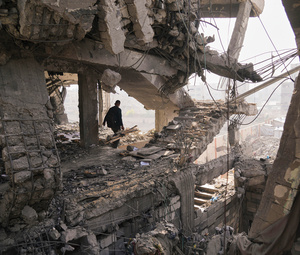
Neocolonialism in Gaza
Palestinian futures are being decided for them yet again as they are dispossessed by the new Trump Plan, argues Yara Hawari. When will Palestinians be free of repackaged colonialism?

Where is the left?
Radical organizing was once backed up by a network of physical spaces. How can we rebuild them to support the movements we need now? By Rosie Hampton.

You’ve got issues, mate
Thanks to a hit film and a terror charge, the hip-hop trio Kneecap are better known than ever before. Far from attention-seeking, their antics bring a proud tradition of cultural resistance to a new frontier, writes Decca Muldowney.

Britain’s undeclared war on Yemen
Ruth Rohde and Jack Cinamon explain how the US and Britain went from selling bombs for use against Yemen to dropping them themselves.

Forever Oil
An oil rush is reshaping Guyana’s future, but as profits bypass locals could a familiar history of exploitation, extraction and colonialism be repeating itself? Ben Jacob reports on a nation at a crossroads.

Women’s agency in war
Sophie Neiman reports from the Democratic Republic of Congo to shine a light on the neglected stories of women bearing the brunt of war.

The empire never died
So-called RAF bases filled with US military personnel are a tell-tale sign of Britain’s key role in US imperialism – not simply as a willing agent, but as a compliant subject. By Matt Kennard.

Singing in dark times
Palestine’s poets, novelists, musicians and journalists have not only voiced their people’s liberation struggle but also driven it. Decca Muldowney charts their role in resisting annihilation and imagining a free Palestine

The betrayal
From arms deals to surveillance tech exchanges, Yara Hawari explains how alliances have been – and continue to be – fostered between Israel and various Arab governments.

‘They want to erase us’
After the government introduced one of the harshest anti-gay laws in the world, LGBTQI+ Ugandans have been living in an increased climate of fear. Amid preparations for a landmark case challenging the law, Sophie Neiman speaks to the people who are promoting the legislation, and the human rights activists putting everything on the line to get it overturned.

Paris isn’t dead yet
The urban areas surrounding Paris are often considered a symptom – or cause – of the failure of France’s social policies. Cole Stangler speaks to residents of the banlieues, and finds exploitation and division – but a spirit of resistance too.

‘They are my ancestors’
For centuries, museums have held human remains as artefacts – including those sold, looted and smuggled out of colonized countries. Hana Pera Aoake explains how New Zealand/Aotearoa has become a world-leader in repatriation. What can be learned from the Indigenous-led programme driving the push to bring ancestors home?

The science of women
Around the world, people are chanting ‘Women, Life, Freedom’ in solidarity with the women’s uprising in Iran – dubbing it the ‘first feminist revolution in the world’. Not so, argues Rahila Gupta, as she examines its precursor: a Kurdish feminist revolution in Rojava.

Hear us roar
It’s 40 years since the establishment of peace camps at the British atomic weapons bases of Greenham Common and Faslane. Speaking to the women at the centre of four decades of resistance, Denise Laura Baker asks what keeps them going.

Once upon a Rio Tinto mining project
When the transnational giant decided to dig for lithium in Serbia it was met by widespread protests. But beyond the people’s rebellion lie deeper questions of imperialism, environmentalism and ‘green’ tech. Andrej Ivančić and Sergey Steblev inspect them in this cautionary tale.

Pants of protest
Humorous yet shocking, mundane yet intimate – underpants have proved a useful tool for change. Katie Dancey-Downs examines the power of political undercrackers.

Is it too late?
As climate change stretches human fragility towards breaking point, should we be preparing for societal collapse? This is the existential question behind ‘deep adaptation’, a theory that is rapidly gaining adherents. Richard Swift assesses how far, if anywhere, it will take us and what better paths we could go down.

The politics of futility
Our deep desire for change is continually thwarted by the limiting political choices on offer. Political theorist and philosopher Neil Vallely digs into the roots of apathy and polarization.

Who will protect the land?
Hazel Sheffield explores how the history of failed land reform in Colombia threatens both people and planet. Illustrations by Léo Hamelin.

Lloyd’s of London’s debt
When it comes to the horrors of the transatlantic slave trade and ongoing support of fossil fuels, what would be the cost of financial reparations? Through exploring the history of a prominent player in the insurance marketplace, Sahar Shah and Harpreet Kaur Paul have an idea of where to start.







.jpg)












